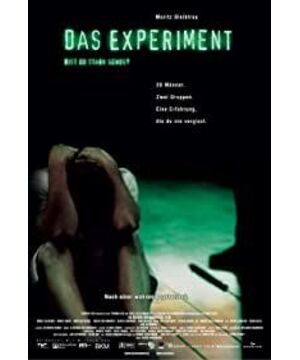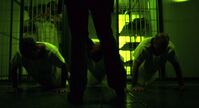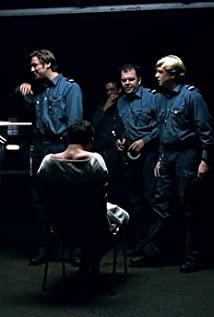Yes, there are only two women in the play, and they are the only external resistance to stop the men's gang from sliding to the edge of destruction. The situation of these two roles also symbolizes the situation of women in the traditional patriarchal society-either being excluded from the outside or being enslaved inside.
One, female doctor Juta. She was the first to discover the prisoners’ abnormal emotional performance, and repeatedly proposed timely intervention and termination of the experiment if necessary. However, the “academic authority” Professor Du En, who was eager for quick success, repeatedly rejected her request and left the monitoring room at a critical moment, thus repeatedly making mistakes. Time to contain the situation.
(The plot of Juta being humiliated and even almost raped further exaggerated the role of women being "humiliated and harmed" under patriarchal violence.)
Second, Dora the piglet. Her anxiety and intervention became an important node for reversing the situation. She sternly claimed "If you can't see me, call the police" and then broke into the experimental field, and finally shot and wounded a jailer with a chilling calmness. (This setting... uh...).
(In the real Stanford experiment, the subjects were also all males, and the end of the experiment was said to be also because a girlfriend of a "jailer" strongly protested against the anti-humanity behavior in the experiment and called for police intervention. The experiment was terminated early.)
The scenes of Moritz and Dora yearning for each other are full of sexual cues, and they are handled quietly and gently, like a utopia of male-female interdependence. This YY world is interspersed with the tense and cruel uniform man and the vacuum man in the prison struggle, forming a sharp contrast.
The scene in which the storm calms down, the camera borrows the vision of a certain wounded person who is drifting away. What he sees is a terrifying world. There are only two kinds of people in this world. One is wearing a prisoner’s uniform and the other is wearing a jailer. Their uniforms (full of metaphors), they support each other, their faces are terrified, and their bodies are stained with blood. Just as the viewer is extremely depressed, the camera suddenly turns, the picture shows Moritz and Dora sitting side by side quietly, fresh fruit and wine, the sky is wide, just like the sixth day of Genesis, God just created a man And women, they are naked in the Garden of Eden, simple and happy. The return of female characters implies the distance from hell to heaven.
Okay, now let's go back to hell, well, the prison world full of uniformed men and vacuum men, handcuffs and batons. Our question is: How should this game be restored? If we go back to the beginning of the experiment, if 77 and Mr. Burris are exchanged, what will the outcome be?
I have to quote Henry Thoreau’s words in Civil Disobedience:
"Most people are in a situation with the government: they are mainly not as human beings, but using their bodies as machines to serve the government. They are the standing army, the self-defense force, the jailer and the police. In most cases, regardless of the value judgment, regardless of the moral meaning, it is impossible to use their brains. People can only equate themselves with dirt, wood and stones; maybe, Making some wooden people can also do these things well. This means that respect for people is not as good as treating grass people or treating a pile of rubbish. Their value is not much different from horses and dogs." ——In
this prison game, obviously, This passage cannot be established. We saw that the jailers headed by Boris completely played out the feeling, state, and creativity in this game-if they were really wooden people or robots, the situation would be much better, unfortunately However, under certain pressure, they indulged in the delusion of being implied that they could gain unlimited power. The defenders of the rules extinguished the rules in a more dangerous way, even in the real world, this is not a solitary evidence. Obviously, Henry Thoreau’s views are obscured by the “veil of ignorance”.
Rawls’s metaphor about the veil of ignorance fully describes a situation in which a person is temporarily blind to his social situation because of falling into a specific social role, and the way to overcome it, plainly speaking, is to maximize transposition. Thinking-if this curtain is unveiled, you find yourself a jailer in uniform, holding a baton, and shackles around your waist, and you are convinced that you are a good person who is dedicated to your duties, then, when you are facing a serious prisoner When threatening and provoking, what kind of reaction is not considered excessive? When you are lacking in information and facing the danger of uncertainty, can you guarantee that you can maintain more rationality and restraint than the Burriss? If you are allowed to participate in the formulation of rules, to what extent do you want your power to maintain order to be limited?
Today's question is to write a propositional composition-"If I'm Urban Management". There is no limit to the number of words.
View more about The Experiment reviews











